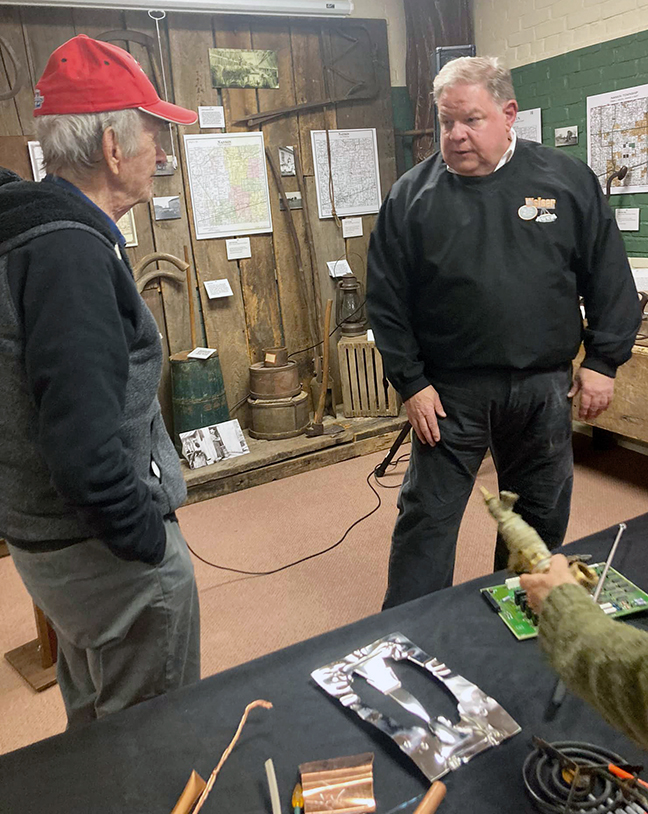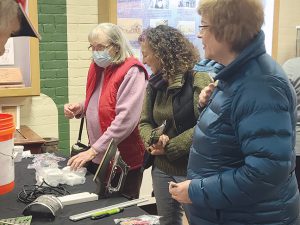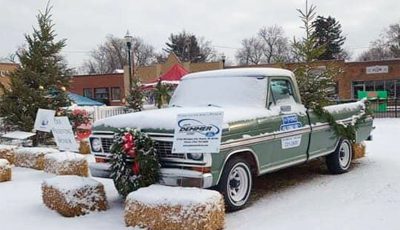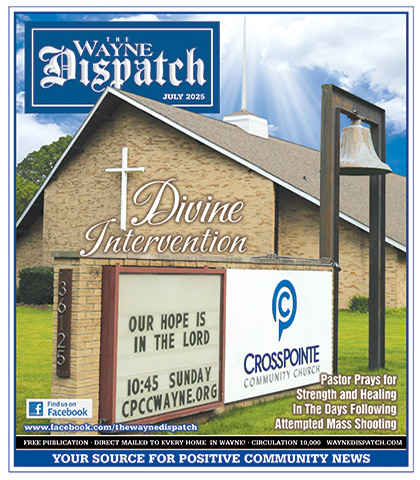You can recycle your metal here in Wayne

Jim Neidert (right) answers questions from an attendee after the program.
By Carolyn Marnon – What do you do when your washer and/or dryer have run their final cycles and kerplunked on you? Do you drag them to the curb in the hopes that a metal scrapper will come by soon and get rid of this now outdoor eyesore? Does the curb also see the demise of some metal fencing scraps, perhaps an old vacuum or just bits and pieces of junk when you are cleaning out the garage?
The scrap metal man gets excited when he sees this metal at the curb. It means he will soon be putting dollars in his pockets. Did you know that those dollars could actually go inside your pockets?
Jim Neidert, General Manager of Weiser Recycling in Wayne recently gave a presentation at the Wayne Historical Museum to encourage more people to recycle all of their household metals, including old grills, rusty shelving, mismatched tools and other items you don’t know what to do with. While cleaning out this old stuff and making space in your home, you can also make a few bucks. Neidert claimed that some of those scrap metal men you rely on make more recycling metal than they do in their monthly pension checks.
Back in the early 1950s, Nate Weiser opened his metal recycling business in a location behind the Ford Plant. Nate Weiser also happens to be the gentleman who is connected to the beginnings of the dictionary program the Wayne Rotary Club continues to this day. Nate died several years ago.
“It’s a real dirty kind of thing when you’re digging for scrap metal,” said Neidert. He gave away keychains with magnets that detect metals, magnetic flashlights, pens and first aid kits “in case you get cut scrapping.”
If you decide to try scrapping your own metal, it’s good to know that all you have to do is bring the metal to Weiser Recycling (35900 Clinton St, Wayne). The employees there will sort it and send it to be melted. You don’t even have to separate your metals, but the more you do separate, the more money you get. “The more you know your metals,” said Neidert, “and segregate them, the more you take home.”
While you are searching for scrap metal, it’s handy to have a magnet with you. Iron and steel are magnetic. Copper is not magnetic. Have you ever thrown away Christmas light strings that have stopped working? There is copper wire inside those light strings that can be recycled. Don’t throw them away! Those lights could be worth a few dollars. Start a metal recycling box or bin and start throwing your old metals into it. When it’s full, take it for recycling. Household metal recycling might not make you rich, but it could put a few extra dollars in your pocket.
Did your toaster, iron, or can opener stop working? Cut off the cord at the appliance and the plug in and add it to your new recycling pile. Always practice safety first and only cut the cords when the appliance is unplugged! Other items to throw in your box could include computer towers, Intel processors and computer boards, old brass faucet pipes, aluminum siding, filing cabinets, electric stove burners and stainless steel.
Once you have at least a pound of materials, you can bring it in. To make it worthwhile, you might wish to collect more before taking it in, but a pound is the minimum to get paid. Weiser Recycling has a state-certified scale. Weiser has an Olympus Xray Refraction Gun that tells the buyer the makeup of the metals of the items.
How does Weiser weigh your items? Neidert said your vehicle is weighed with the items in it, you unload the items, and then they reweight your vehicle. He commented that the average truckload can net about $100.

Nancy Pride (left) discusses metal recycling with two other attendees of the program.
Weiser does not buy cars. The building is on porous land. The EPA (Environmental Protection Agency) won’t let them buy cars because then the recycling business would need to drain all the fluids and those fluids would contaminate the land Weiser sits on.
The biggest concern people seem to have with metal scrapping has to do with the possible recycling of stolen articles. Neidert said that back in 2014 the theft of copper was a real problem. There has been legislation made that dictates how a recycling firm acquires and processes metals. There is a $25,000 fine if the business buys a manhole cover. Buyers also cannot buy air conditioning parts or catalytic converters.
If you bring something in to be recycled, you will not get paid on the spot. The business will mail you something that you then have to bring back along with your government-issued ID. You will have to sign paperwork stating you are not giving the business any stolen materials, and your thumb print will be taken along with a picture of you. When you come back to the business, there is an ATM in the building to use to get your payment. It might seem like a lot of work on your part to get paid, but why would you have a problem taking these actions if you’ve done nothing wrong in acquiring the metal you’ve turned in?
Neidert shared that at one time, the price of copper was fluctuating so often that people would buy copper at Home Depot and then sell it as scrap at the right time and make money. Although this is unlikely to happen in the near future, it’s something to keep in mind as you delve into the world of metal scrapping.
If you do take the plunge, let me know about your experience. Carolynmarnon1@gmail.com










